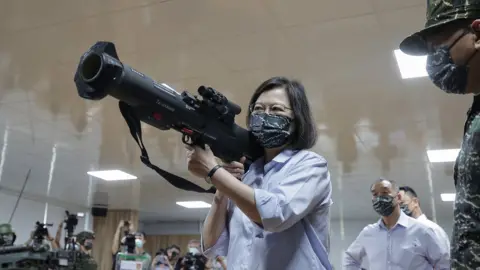Taiwan: China attack not imminent, but US watching closely, says Gen Milley
 EPA
EPAA Chinese attack on Taiwan is not imminent, the top US general says, but the US is watching "very closely".
China is clearly developing the capability to attack at some point, but deciding to do so would be a political choice, Gen Mark Milley told the BBC.
China says Taiwan is a breakaway province that must be re-unified with the mainland, by force if necessary.
It has accused the US of supporting Taiwan's independence, and vowed to "resolutely crush" any such attempt.
There has been a marked escalation recently between China and the US - Taiwan's most powerful ally.
China has been sending scores of warplanes into Taiwan's air defence zone, while the US has sent naval ships through Taiwan's waters.
In May, US President Joe Biden said China was "flirting with danger" by flying its warplanes close to Taiwan. He vowed to protect the island militarily if it was attacked.
Beijing retorted by accusing the US of "violating its promise on Taiwan" and "interfering" in China's affairs, adding the country "would not hesitate to fight" to prevent Taiwan from formally declaring independence.
'We watch [China] very closely'
Asked whether he thought China would attack Taiwan, Gen Milley, chairman of the US joint chiefs of staff, told the BBC:
"Could, should, would, those are key words there.
"In terms of capability I think China clearly is developing a capability. President Xi [Jinping] has mentioned that in public forums, he's mentioned it in speeches, that he has challenged the PLA [China's People's Liberation Army] to develop the capability to attack Taiwan at some point in time.
"And whether they would or not, it's a political choice, it's a policy choice, that will be based off of how the Chinese view the cost risk benefit at the time."
"There's no indications or warnings of anything imminent at this time. But again, we watch it very, very closely," Gen Milley added.
The US has no official diplomatic ties with Taiwan, but sells arms to it as part of its Taiwan Relations Act, which states that the US must provide the island with the means to defend itself.
At the same time, it maintains formal ties with China and also diplomatically acknowledges China's position that there is only one Chinese government.
China deems an attack costly

Analysis by Tessa Wong, Asia Digital Reporter, BBC News
One major fear is that war would be triggered if China invades Taiwan. Beijing has said in the past it could reclaim the island by force if necessary.
But most analysts say this is not likely - for now.
There has been debate over whether China has the military capability to succeed in an invasion, and Taiwan has been considerably ramping up its air and sea defences.
But many agree that Beijing recognises that such a move would be too costly and disastrous - not only for China, but also for the world.
China's consistent position has been that it seeks "peaceful reunification" with Taiwan - and that it would only act if faced with a provocation.
One trigger would likely be Taiwan formally declaring independence. But this is something that its President Tsai Ing-wen has strenuously avoided, even as she insists they are already a sovereign state.
Most Taiwanese support this position, which is known as "maintaining the status quo", though increasingly a small number say they want to move toward independence.
Similarly, the US would be reluctant to be drawn into a costly military conflict in Asia, and has signalled repeatedly that they do not want war.
 Taiwan Presidential Office
Taiwan Presidential Office
China and Taiwan: The basics
- Why do China and Taiwan have poor relations? China sees the self-ruled island as a part of its territory and insists it should be unified with the mainland, by force if necessary
- How is Taiwan governed? The island has its own constitution, democratically elected leaders, and about 300,000 active troops in its armed forces
- Who recognises Taiwan? Only a few countries recognise Taiwan. Most recognise the Chinese government in Beijing instead. The US has no official ties with Taiwan but does have a law which requires it to provide the island with the means to defend itself.

